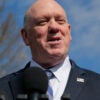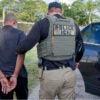On Wednesday, President Obama addressed the nation concerning an uptick of action against the Islamic State, otherwise known as ISIS or ISIL. It was a short address that also was short on surprises.
Never tell your enemies what you will not do, Mr. President.
Obama began with an apt description of ISIS and the threat it poses. In this phase of his remarks, he got it right. ISIS is a horrendous group of murderers whose savagery knows no bounds. Action must be taken. He also emphasized there is a real threat to the homeland—not an immediate one perhaps but one that requires action.
The Daily Signal depends on the support of readers like you. Donate now
Obama attempted to paint all the military actions taken so far as having been successful. In this, he probably overstated at least a bit. Recent operations have helped, but the problem won’t be solved without additional actions.
>>> VIDEO: The Unintended Consequences of Obama’s ISIS Strategy
Obama also is correct that this is not only a U.S. problem. The Iraqis have a new government and at least a few allies have signed up to the embryonic coalition. He offered little on who was in the coalition and what they had signed up to do. Will they provide combat troops, funding, or just rhetorical support? That remains to be seen.
The next section began to float toward hyperbole. The president spoke of a “comprehensive counterterror strategy.” He gave Yemen and Somalia as examples of the validity of this methodology.
Specifically, he mentioned:
1. Direct military action: air power, special operators to kill leaders, including going into Syria to pursue them. This appears to be more of this administration’s love of drone strikes and “whack-a-mole” attempts to find the “head.”
2. Indirect military action: Depend on other peoples’ “boots on the ground.” Send nearly 500 additional advisers to help but have absolutely no combat role for U.S. ground forces. This is absurd, unless the definition of “no combat” is stretched to include our special operations forces going with regional forces to stiffen their spines and control air strikes.
This also includes support to “moderate” resistance forces in Syria. This is a nice concept but quite difficult in practice. Even if one concedes we can correctly identify the “good guys” among the mostly radical forces fighting Assad, how do we keep the arms we give them out of the hands of their radical competitor resistance fighters?
3. External Actions: Cut funds, and stop the flow of foreign fighters. This worked with core Al-Qaeda, but ISIS is far less dependent on outside funding. It has stolen huge amounts from banks in Syria and Iraq, and it sells black market oil to the tune of $1 million a day. Trying to get other countries to stop their citizens from joining the fight also is a nice thought but probably impossible.
4. Humanitarian assistance: This is primarily for displaced persons fleeing the oppression of ISIS. This is the most “doable” part of the president’s plan.
>>> SEE MORE: Obama’s 4-Point ISIS Strategy Explained in 3 Minutes
Obama must do all of the above with allied help and coalition partners. He mentioned that Secretary of State John Kerry in particular was seeking more Arab assistance. Unfortunately, Kerry’s credibility is weak, and the Arab countries are not big “joiners” when the fight is tough. But the president is right to seek this. It is a key to any measure of success.
Obama’s short address on ISIS was short on surprises.
Lastly, the president wants congressional support. He should invest the effort to build it. If he expects to get a free pass from Capitol Hill, with no questions or desire for an elaboration on the plan, he will be surprised. Congress wants to be supportive, regardless of party. It sees the need but will back only a potential winner. Obama has a bit more convincing to do.
The conclusion was spent reminding the American people of the ever-present risks in military actions and the fact this will take time. This was wise, and Obama fought the temptation to put a date certain onto the conclusion of the operation.
>>> WATCH: Ted Cruz Slams Obama’s ‘Photo-Op Foreign Policy’
Obama did spend too much of the wrap-up on emphasizing how this is different from “Bush’s wars.” He could not resist the added emphasis here that again, there would be no ground combat role. Never tell your enemies what you will not do, Mr. President.
The final words were an attempt to convince the listeners that his leadership has been successful. That “case” is weak. Now the nation will wait to see if this works.
>>> Heritage’s Bucci, Phillips See No Easy Answers in Long Fight






























